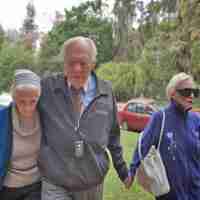Closeness and intimacy

It’s a truism that we all benefit from an appropriate and adequate amount of closeness and intimacy in our lives, and that doesn’t change as we get older. At the same time, opportunities for appropriate intimacy often decrease with age, which leaves many of us with a deeply-felt touch-deficiency. It can be a vicious cycle, where we don’t have intimacy and forget how to give and receive it. This tends to be more true for men, traditionally less tactile, than it is for woman, and means that most older men have little idea about how to offer and receive intimacy, and when they do they tend to be limited by outdated ideas about sex and sexual roles.
In a recent Australian survey, adults aged between 51 and 89 were asked a series of open-ended questions about sexuality, intimacy and desire, and changes to their experiences in later life. The most important thing that emerged is that though people still considered sexual expression and sexual urges to be important, they were not the main focus for many people over fifty. For most respondents affection, trust, respect and compatibility were seen as more important aspects of sexuality than sexual intercourse. Overall the message was about the quality of the experience and the desire for connection rather than the frequency of sexual activity. People did discuss challenges to sexual expression and intimacy such as illness, “performance” issues, mood, lack of opportunity or a suitable partner, but most felt these were not something they particularly focused on in their own lives. The overall response was that touching, hugging and kissing are the most important ways of expressing intimacy.
These results challenge both the stereotype of the asexual older person, and the idea that intercourse is necessary to be considered sexually active. Despite its importance, the importance of late life intimacy has been neglected by institutional caregivers, health professionals and policy makers alike. We of this generation need to take control of things for ourselves to make sure we have the closeness and touch we need and deserve. As experienced gerontologist Robert Kastenbaum writes, “Gerontologists have made considerable progress in the study of sex, but relatively little in understanding romantic love and intimacy in later life. We do not have a comprehensive gerontology unless we know something about this realm. Loving is not encompassed by the frequency of reported sexual interests and activities. All the ‘dirty old men’ jokes in the world do not dilute the poignancy of love and sex in later life.”


